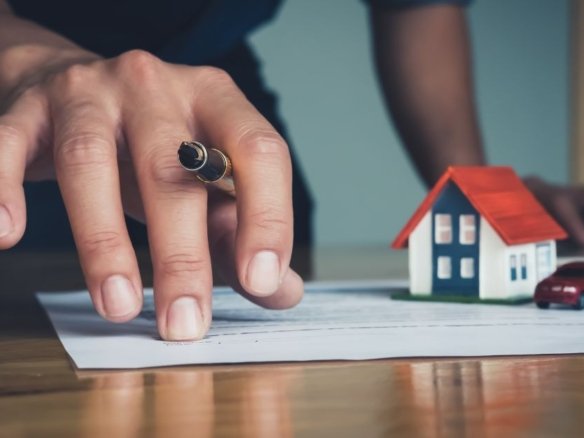🔍 Introduction
When purchasing a property from a private developer, verifying ownership documents is essential to ensure a legal, dispute-free, and secure investment. Many buyers unknowingly fall into legal traps because they fail to check the authenticity of ownership papers.
This guide will help you understand:
✔ What are the mandatory ownership documents required?
✔ How can you verify the ownership of a property?
✔ Where and how to check these documents legally?
Mandatory Ownership Documents for a Private Developer Property 📑✅
When buying a property from a private developer, it is essential to verify the ownership documents to ensure a legal and hassle-free purchase. Without proper documentation, you could face legal disputes, financial losses, and difficulties in obtaining utilities or home loans.
Below is a detailed explanation of all the mandatory documents required for a property purchase from a private developer.
1. Title Deed (Ownership Proof) 📜🏡
The Title Deed (also known as the Sale Deed or Mother Deed) is the primary document that proves ownership of the land on which the project is built. It establishes whether the developer has the legal right to sell the property.
Key Points:
✔ The Title Deed must be clear and marketable, meaning the land has no legal disputes.
✔ It should be in the developer’s name, confirming they own the land.
✔ It should not have any encumbrances (loans, mortgages, or pending legal claims).
How to Verify the Title Deed?
✔ Ask the developer for a certified copy of the Title Deed.
✔ Visit the Sub-Registrar’s Office to cross-check if the title is clear.
✔ Get a legal expert to review the document for hidden issues.
💡 Tip: If the Title Deed is not in the developer’s name, avoid investing in the project! 🚩
2. Sale Agreement 📝🤝
The Sale Agreement is a legal contract between the buyer and the developer that outlines the terms and conditions of the purchase. It is signed before the Sale Deed is executed.
What Does It Include?
✔ Sale Price of the Property 💰 – The total amount the buyer has to pay.
✔ Payment Schedule & Possession Date 📆 – Specifies when and how payments should be made and the expected handover date.
✔ Penalties for Delays ⚖️ – Protects the buyer if the developer fails to deliver the property on time.
✔ Details of the Property – Includes unit number, size, location, and specifications.
Why Is It Important?
✔ Legally binds the developer to complete the project as per the agreement.
✔ Ensures buyers’ rights are protected, especially in case of delays.
✔ It must be registered at the Sub-Registrar’s Office under the Registration Act, 1908.
💡 Tip: Never sign a sale agreement without consulting a real estate lawyer. 🔍
3. Completion Certificate (CC) & Occupancy Certificate (OC) 🏗️✅
The Completion Certificate (CC) and Occupancy Certificate (OC) are issued by the local municipal authority and are crucial for ensuring the property is legally constructed.
Completion Certificate (CC) 📜
✔ Confirms that the building has been constructed according to the approved plan.
✔ Issued only after authorities verify compliance with local regulations.
Occupancy Certificate (OC) 🏠
✔ Certifies that the property is safe for living and meets fire, environmental, and structural safety norms.
✔ Required for getting water, electricity, and sewage connections.
✔ Without an OC, living in the property is illegal.
💡 Warning: If the builder does not provide an OC, the property is considered unauthorized, leading to legal trouble! ⚠️
4. Approved Building Plan & Layout Plan 📐🏢
Before construction begins, the developer must get the building plan approved by the local municipal corporation or development authority.
Why Is This Important?
✔ Ensures that the construction follows zoning laws and land use regulations.
✔ Confirms that the project is not built on unauthorized or illegal land.
💡 Tip: Cross-check the approved building plan with the municipal authority to verify its authenticity. 🚧
5. Encumbrance Certificate (EC) ⚖️📜
An Encumbrance Certificate (EC) is an official document that provides a history of ownership and legal liabilities on the property.
Why Is EC Important?
✔ Proves that the property is free from legal claims, debts, or mortgages.
✔ Contains details of all previous transactions on the property.
How to Get an Encumbrance Certificate?
✔ Apply at the local Sub-Registrar’s Office.
✔ Request for EC records of at least 15–30 years to check for any disputes.
💡 Tip: Never invest in a property without verifying the EC to avoid buying disputed land. 🔍
6. Land Use Certificate (Zoning Certificate) 🌳🏗️
A Land Use Certificate confirms the type of land classification (residential, commercial, industrial, or agricultural).
Why Is It Important?
✔ Prevents illegal construction on restricted land.
✔ Ensures that the property is legally permitted for residential or commercial use.
💡 Tip: Check this with the Town Planning Department before making a purchase! 🏙️
7. No Objection Certificates (NOCs) 🚦📑
Before starting construction, the developer must obtain NOCs from various authorities.
Essential NOCs Required:
✔ Fire Department 🔥🚒 – Ensures compliance with fire safety norms.
✔ Pollution Control Board 🌿♻️ – Confirms adherence to environmental laws.
✔ Water & Sewage Department 🚰💧 – Ensures proper water supply and drainage systems.
✔ Electricity Board ⚡ – Verifies proper power supply connections.
💡 Tip: Ask the developer for copies of all NOCs before signing the agreement! ✅
8. RERA Registration Certificate 🏗️📜
Under the Real Estate (Regulation and Development) Act, 2016 (RERA), all private developers must register their projects with the respective state RERA authority.
Why Is RERA Registration Important?
✔ Ensures the developer follows legal guidelines and protects homebuyers.
✔ Prevents fraud and illegal constructions.
✔ Provides transparency on project details, approvals, and progress.
How to Verify RERA Registration?
✔ Visit your state’s RERA website.
✔ Enter the project’s RERA registration number to check details.
💡 Tip: If a project is not RERA-registered, it is a red flag 🚩, and you should avoid investing in it!
9. Property Tax Receipts & Utility Bills 💰📄
These documents prove that the developer has paid all taxes and utility bills before selling the property.
Why Are These Important?
✔ Ensures that the property is free from outstanding municipal dues.
✔ Prevents buyers from inheriting unpaid property taxes or utility bills.
How to Verify?
✔ Ask for latest property tax receipts, electricity bills, and water bills.
✔ Cross-check with the municipal authority.
💡 Tip: If property tax or utility bills are unpaid, negotiate with the developer to clear them before purchase!
How to Check Property Ownership Documents? 🔍✅
Before finalizing a property purchase, it is crucial to verify ownership documents to avoid fraud, legal disputes, or financial risks. By following the steps below, you can ensure that the property you are buying is legally owned by the seller or developer and free from legal complications.
1. Verify the Title Deed at the Sub-Registrar’s Office 📜🏡
The Title Deed is the most important document that proves ownership of the land or property. It contains details about the current and past owners, ensuring that the seller has the legal right to sell the property.
How to Verify the Title Deed?
✔ Request a Certified Copy – Ask the seller or developer for a certified copy of the Title Deed.
✔ Check Ownership History – Ensure that the property is registered under the seller’s name and that the ownership is clear and undisputed.
✔ Confirm No Prior Ownership Disputes – Cross-check the document to see if there are any pending court cases or disputes over ownership.
✔ Visit the Sub-Registrar’s Office – Physically verify the Title Deed by checking records at the local Sub-Registrar’s Office where the property is registered.
💡 Tip: If the Title Deed has multiple ownership transfers, consult a property lawyer to ensure there are no hidden claims.
2. Get an Encumbrance Certificate (EC) ⚖️📜
An Encumbrance Certificate (EC) is a critical document that shows whether the property is free from any legal or financial liabilities. It contains records of past transactions, mortgages, or loans on the property.
How to Obtain an EC?
✔ Visit the Sub-Registrar’s Office – Apply for an EC in the same office where the property was registered.
✔ Check Online Availability – Many states provide EC verification online through government portals.
✔ Request for EC of Past 15–30 Years – Ensure there are no unpaid loans, legal claims, or court cases related to the property.
Why Is an EC Important?
✔ Confirms that the property is not under any bank loan or mortgage.
✔ Ensures that the property has a clear financial history.
✔ Protects buyers from hidden legal complications.
💡 Tip: If an EC shows an active loan or claim, ask the seller to clear all dues before purchase.
3. Check RERA Registration Online 🏗️💻
Under the Real Estate (Regulation and Development) Act, 2016 (RERA), all real estate projects must be registered with the respective state RERA authority. This ensures that the project follows legal guidelines and protects homebuyers.
How to Verify RERA Registration?
✔ Visit Your State’s RERA Website – Each state in India has its own RERA portal where buyers can check project details.
✔ Enter the RERA Registration Number – Developers must provide a unique RERA number for their projects.
✔ Verify the Developer’s Details – Check the builder’s credentials, project approvals, and legal status.
Why Is RERA Registration Important?
✔ Confirms that the project is legally approved and meets construction standards.
✔ Protects buyers from fraudulent developers and illegal constructions.
✔ Provides transparency on project status, approvals, and developer details.
RERA Websites for Major States:
📌 Maharashtra: maharera.mahaonline.gov.in
📌 Karnataka: rera.karnataka.gov.in
📌 Delhi: rera.delhi.gov.in
💡 Tip: If a project is not RERA-registered, it’s a red flag 🚩 – avoid investing in it!
4. Cross-Check Building Plan Approvals 📐🏢
Before purchasing a property, ensure that the building plan and layout have been approved by the local municipal corporation or development authority.
How to Verify?
✔ Visit the Municipal Corporation Office – Check if the project’s building plan is approved.
✔ Compare the Layout Plan with the Actual Construction – Ensure that the project follows the originally approved layout.
✔ Confirm Land Use Certificate (Zoning Certificate) – Make sure the land is designated for residential or commercial purposes and not for agriculture or industrial use.
Why Is This Important?
✔ Prevents buying unauthorized or illegal constructions.
✔ Ensures that the project follows zoning laws and land use regulations.
✔ Avoids future legal issues or demolition orders from authorities.
💡 Tip: Unauthorized constructions can lead to legal disputes, demolition, or loss of investment – always verify approvals before purchase.
5. Consult a Property Lawyer 🏛️⚖️
While verifying property documents, it’s always a good idea to consult a real estate lawyer to ensure there are no hidden legal issues.
Why Should You Consult a Lawyer?
✔ A legal expert can review all ownership documents and verify their authenticity.
✔ Helps in identifying fraudulent transactions and illegal constructions.
✔ Assists in drafting and verifying the Sale Agreement, Title Deed, and other legal documents.
✔ Ensures that all necessary approvals, taxes, and legal formalities are completed before purchase.
💡 Tip: Do not rely solely on the developer or seller for document verification. Always get legal assistance before making a purchase.
Final Verdict: Always Verify Before You Buy! ✅🏡
Purchasing a property from a private developer can be a safe and profitable investment—but only if you verify all ownership documents beforehand. Many homebuyers overlook crucial legal checks, leading to disputes, financial losses, or difficulties in selling the property later. To avoid such issues, it is essential to conduct thorough due diligence before signing any agreements.
Below, we break down key takeaways to help you make an informed and secure property purchase.
💡 Key Takeaways for Property Buyers
✔ 1. Check the Title Deed & Encumbrance Certificate (EC) to Confirm Ownership 📜🏡
Before buying any property, the Title Deed and Encumbrance Certificate (EC) are the two most critical documents to verify ownership history and legal status.
Why is the Title Deed Important?
✔ The Title Deed (Sale Deed or Mother Deed) is proof that the seller legally owns the property.
✔ It must be in the developer’s name, ensuring there are no ownership disputes.
✔ You can verify the Title Deed at the Sub-Registrar’s Office where the property is registered.
Why is the Encumbrance Certificate (EC) Important?
✔ The EC confirms that the property is free from any legal dues, mortgages, or disputes.
✔ It is issued by the Sub-Registrar’s Office and contains a record of past transactions.
✔ Always check for an EC of at least 15–30 years to confirm the property’s financial history.
💡 Tip: If the Title Deed or EC shows multiple ownership transfers or active loans, consult a property lawyer before proceeding.
✔ 2. Verify RERA Registration to Ensure Legal Compliance 🏗️✅
Under the Real Estate (Regulation and Development) Act, 2016 (RERA), all real estate projects must be registered with the state RERA authority.
Why is RERA Registration Important?
✔ Confirms that the project has legal approval and follows government regulations.
✔ Protects homebuyers from fraudulent developers and delays.
✔ Provides transparency regarding project approvals, construction status, and builder details.
How to Verify RERA Registration?
✔ Visit your state’s official RERA website.
✔ Enter the project’s RERA registration number (provided by the developer).
✔ Check the project’s legal status, approvals, and complaint records.
RERA Websites for Major States:
📌 Maharashtra: maharera.mahaonline.gov.in
📌 Karnataka: rera.karnataka.gov.in
📌 Delhi: rera.delhi.gov.in
💡 Tip: If a project is not RERA-registered, it is a red flag 🚩 – avoid investing in it.
✔ 3. Ensure the Project Has All Approvals (OC, CC, NOCs, etc.) 📑🏢
A legally constructed property must have all necessary approvals from the local authorities.
Essential Approvals to Verify:
📜 Completion Certificate (CC) – Confirms that construction meets approved plans and building codes.
📜 Occupancy Certificate (OC) – Certifies that the building is safe for living and legally habitable.
📜 No Objection Certificates (NOCs) – Includes clearances from the fire department, water & sewage authority, electricity board, and pollution control board.
Why Are These Approvals Important?
✔ Without a CC & OC, the building may be illegal, leading to utility disconnections, penalties, or demolition risks.
✔ Banks will not approve home loans for properties lacking an OC.
✔ Future resale may become difficult without these approvals.
💡 Tip: Ask the developer for copies of all approvals and cross-check them with the local municipal authority.
✔ 4. Consult a Property Lawyer Before Signing Any Agreement 🏛️⚖️
Even if you verify all documents yourself, a legal expert can provide extra security by spotting any hidden legal issues.
Why Should You Hire a Lawyer?
✔ Ensures all documents are genuine and free from legal complications.
✔ Helps review the Sale Agreement, Title Deed, and other legal contracts.
✔ Identifies hidden property disputes, pending dues, or fraudulent transactions.
✔ Provides legal guidance in case of property disputes or title issues.
💡 Tip: Do not rely solely on the developer for document verification. Always consult a real estate lawyer for legal due diligence.





Join The Discussion